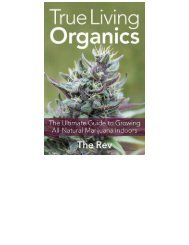You also want an ePaper? Increase the reach of your titles
YUMPU automatically turns print PDFs into web optimized ePapers that Google loves.
according <strong>to</strong> the label instructions <strong>to</strong> finish off hungry females. I think plants finished with this nutrient<br />
are all fine and smooth, but like anything else, don’t use <strong>to</strong>o much, especially <strong>to</strong>wards the very end<br />
(last couple weeks) of flowering. It’s best <strong>to</strong> feed your plants pure water for the last two weeks<br />
before harvest.<br />
Roots <strong>Organics</strong>’ Extreme Serene is my safety net in the flowering stage<br />
This is one of those great nutrients, full of organic matter and derived from great sources, with<br />
many similarities <strong>to</strong> Fox Farm’s Big Bloom nutrient sources, including kelp and earthworm castings<br />
and/or guanos. <strong>The</strong> Extreme Serene is pretty heavily chelated with organic acid(s) and your first clue<br />
here is the severe pH-down effects it has on the water. I start out using this at ½ recommended<br />
strength the first time, and often that’s the only booster shot I need <strong>to</strong> finish well. However, if I don’t<br />
screw up then I have no need for this nutrient, as it is really more suited <strong>to</strong> “Soup-Style” organic<br />
growing, which is explained elsewhere in this book.<br />
Molasses<br />
Molasses has an N-P-K ratio of around 1-0-5, so not that much is needed, and in teas I usually use<br />
about 1 tablespoon per gallon. If I were using it on the plants immediately, I would use more like 1<br />
teaspoon per gallon, but I rarely, if ever, use it outside of teas. It also helps other nutrients <strong>to</strong> be<br />
absorbed by plant roots by means of mild chelation. Make sure you use the “unsulfured” version of<br />
molasses, and I recommend those that are overtly organic; make sure it says ALL natural or organic.<br />
Blackstrap molasses is awesome, and is my preferred type. It’s just a bit <strong>to</strong>ugher <strong>to</strong> find, and if it’s not<br />
readily available where you are, either kind of molasses works fine.<br />
Care should be taken during the last few weeks of flowering when using a lot of molasses in teas.<br />
<strong>The</strong> high magnesium value of molasses, which is one of its great assets, can be detrimental <strong>to</strong> the



